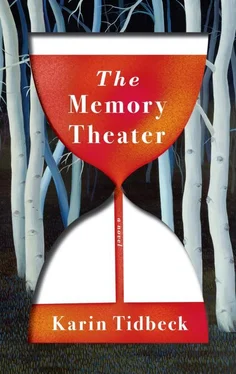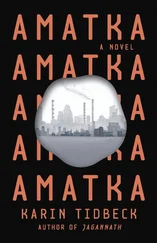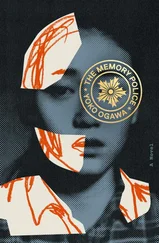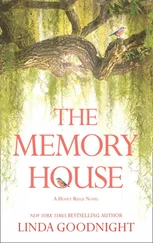She fumbled her way along the wall. Across from the kitchen, the closed door to what must be Pinax’s bedroom; she shuffled along and found the second door to the left that led to the study. She put her ear to the door. It was quiet. She scratched on the wood with her fingers. When there was no reply, she pushed down the handle and peeked inside. Nothing. She felt the wall next to the door and found the light switch. The study was very orderly, just like everything else in this house: bookshelves, a large desk, a chair, and a lamp. At the back of the room, the door that led to the hidden library. She tried the handle. It was unlocked.
A wave of heat hit Augusta’s face as she descended the spiral staircase, and she could hear the distant roar of flames. The double doors were ajar.
The room was illuminated by some light source that Augusta couldn’t make out; shadows danced across the books and scrolls on the shelves. Pinax sat cross-legged on the floor with their back turned. They didn’t move as Augusta took the last few steps inside and stepped around them.
Pinax’s eyes were closed; they were seemingly lost in meditation or sleep.
“Pinax,” Augusta whispered, but the librarian didn’t react.
Augusta turned her attention to the shelves.
At the very edge of a shelf, almost hidden beneath a scroll, she saw a flat lacquered box, unmarked. It was the only thing in here that was not ancient. Augusta tucked the box under her arm and backed out of the room. Pinax remained where they were.
Back in the study, Augusta closed the door behind her and opened the box. It was full of envelopes, all with Pinax’s name on the back, some of them with addresses: Vienna, Cairo, Paris. She opened some of them. They were in all kinds of languages, most of which she could not read. Then, there was a cream-colored envelope in thick paper addressed in Latin: To my dear friend Pinax . Augusta opened it.
The letter was short.
I will go north, to Frostviken. Thank you for your kind hospitality. Wish me well. We will not meet again.
—P
There was a northbound train in the morning. Augusta watched people climb aboard. Then she herself mounted the steps and claimed a compartment. The train conductor didn’t trouble her after she had spoken to him firmly. The train chugged northward, and the landscape gradually changed from farmland to snow-flecked blunt mountains.
“Our play?” Thistle said.
“The two of you have told us your stories, so we must play them,” Director said.
The company turned the sofa to face the carriage, folded back the wall of the house, and climbed inside. Dora and Thistle sat down on the sofa. Thistle took Dora’s hand. A velvet curtain unfurled from the ceiling and covered the house’s interior.
—
A gong rang, and the curtain rose. The armoires, the kitchen, the mess had disappeared; instead there was a luscious grove with marble statues peeking out from behind leafy trees. The backdrop was the turquoise of just after sunset. Little lanterns hung in the branches of the trees.
Nestor stood at the far edge of the stage, dressed in a doublet and puffy knee pants.
“Welcome, all, to the mystic Gardens,” he intoned, “a timeless place of magic and debauchery, ruled by mad and fickle lords and ladies. Here is a boy, lured away from his parents. Little does he know what fate will befall him.”
Apprentice wandered onstage as a boy. He was dressed in simple trousers and a shirt with a rounded collar, his hair smoothed back into a queue. He looked around the grove with wide eyes.
“I thought I saw a light,” he said. “I thought I heard a song. It was so beautiful, I had to follow. Now all is quiet. Where did it go?”
“Oh, it is all here,” said a voice from the other side of the stage.
Director emerged from the right, dressed in a brocade coat and a shirt with lace ruffles. Thistle gasped. Director looked thinner, her features sharper, and her kohl-rimmed eyes had a predator’s unblinking stare. She stalked across the stage like a wild beast. She looked very much like Augusta.
“Who have we here?” she said to the boy, who stared at her in awe. “All alone in the woods.”
“What is this marvelous place?” the boy asked.
Augusta made a sweeping gesture. “These are the Gardens, where youth and beauty celebrate a bright summer night. Will you join us in the revels?”
“Oh, I don’t know,” the boy said. “But I am awfully hungry.”
Augusta waved her left hand and seemed to conjure an apple out of thin air. “Here, my dear. Taste this.”
The boy took the apple.
Thistle tensed up on the sofa. “Don’t eat it,” he mumbled.
Dora put a hand on his knee. “It’s only pretend,” she said.
Thistle let out a groan as the boy bit into the apple, chewed, and swallowed.
“I have never tasted anything sweeter,” the boy said.
“Nor will you ever again,” Augusta replied, “for the fruit of the Gardens is legendary. Now tell me your name.”
The boy stood on his toes and whispered something into Augusta’s ear.
“Very good, my darling,” Augusta said, and took his hand.
The boy smiled up at her.
“I have your name, and you have eaten of our fruit,” Augusta said. “I name you Thistle, and a thistle you shall become.”
The curtain fell. On the sofa, Thistle curled up against Dora.
—
“Scene two!” Nestor announced.
The curtain rose again, and the backdrop had changed: a vast horizon of undulating mountains, their tops scraped soft and covered in snow. In the middle of the stage lay a pile of dirt.
Director swept in from stage right. Somehow she had managed to change into another costume in a matter of seconds: she was wrapped in black silk that fluttered around her as she moved. Her eyes shone a startling yellow.
“How do they do that?” Thistle whispered.
Director shaded her eyes and spied across the stage.
“Where is the seed that I sowed? Deep did I plant it, in the heart of this ancient mountain range. Long have I waited for it to take root. I, Ghorbi, am patient, but my patience has limits.”
The pile of dirt moved.
“Aha!” Ghorbi cried, and hurried over.
A hand reached out of the pile and waved in the air. Ghorbi took it. Journeyman, dressed in a grubby shift, emerged from the mound and stood up.
“There she is,” Ghorbi announced. “The daughter of the mountain, big and strong.”
It did look very much like Dora, wearing what must have been a wig, although so well made that it looked like real hair. Journeyman-as-Dora’s form was rounded and powerful, and she stood with both feet firmly planted on the ground. She gazed out at the audience, not seeming to notice them. Then she looked at Ghorbi.
“What is my name?” Dora asked on the stage, her voice soft but strong.
“Your name is your own,” Ghorbi said. “But I will lend you one, if you like: Dora.”
—
“Scene three!” Nestor announced. “Thistle and Dora.”
Onstage, Dora sat in the shade of a tree whose branches drooped with apples. Her eyes were vacant, and she was covered in dirt. She was humming tunelessly to herself. Then, from the left, Thistle walked in. His shirt and hands were spattered scarlet. Behind him, Director was Augusta again, pushing him ahead of her into the orchard.
“There,” she announced. “Here is your charge. When you are not with me, you will mind the giant and make sure she makes no trouble. If she does, you will be sorry.” She took a step backward and disappeared.
Dora looked up at Thistle and got to her feet.
“You are hurt,” she said.
“I am indeed,” Thistle said, but stood up straight.
Читать дальше










![Карин Тидбек - Аматка [ЛП]](/books/438406/karin-tidbek-amatka-lp-thumb.webp)

